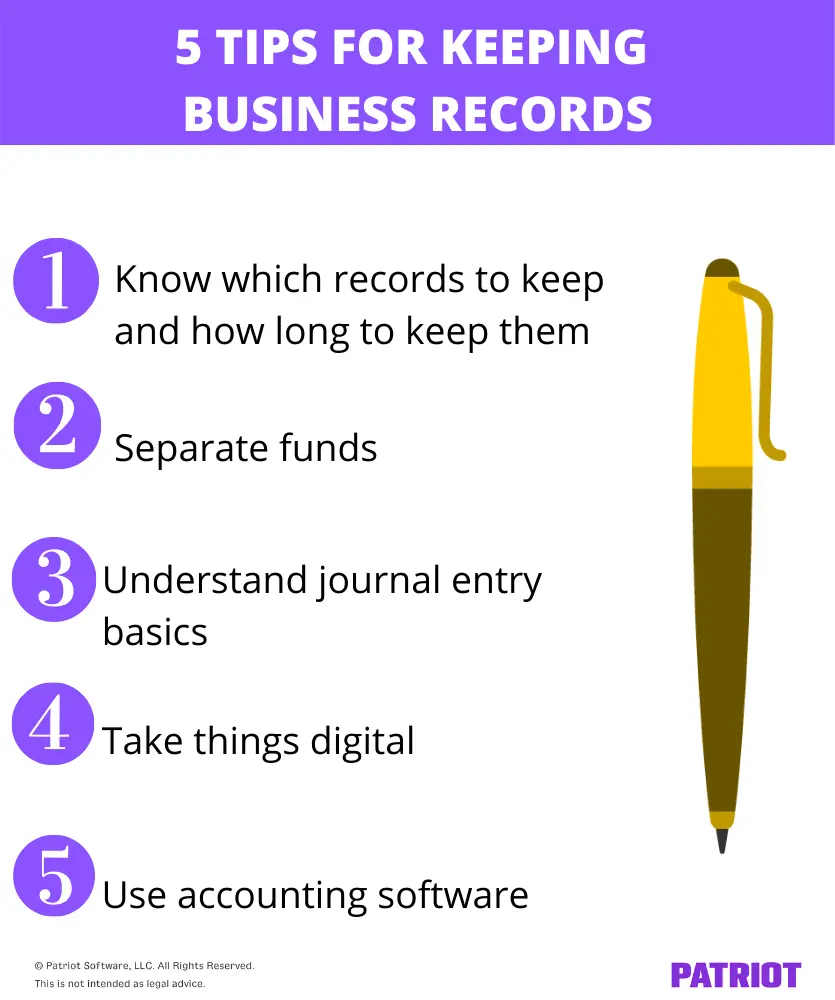Strong recordkeeping skills? You’re in business. Poor recordkeeping skills? Time to step it up. Keeping business records is an important part of operating a healthy business, making decisions, and being eligible for business tax credits and loans.
5 Tips for keeping business records
Whether you’re filing taxes or applying for PPP loan forgiveness, you know how much easier it is the more organized you are.
If you want to take your financial recordkeeping skills to the next level, check out the following five tips.

1. Know which records to keep and how long to keep them
First things first … what kind of records do you need to keep, and for how long?
There are a number of business records you should hold onto. When in doubt, it’s better to be safe than sorry and keep the records than throw them away or delete them.
Be sure to keep the following records:
- Business tax returns
- Financial statements
- Income statements
- Balance sheets
- Cash flow statements
- General ledger
- Bank statements
- Credit card statements
- Check registers
- Receipts
- Contracts
- Business agreements (e.g., operating agreement)
- Permits and licenses
- Insurance documents
- Payroll records
- New hire forms
OK, now how long do you need to keep these records for? Well, it depends on the type of record. The IRS has a time frame for some records while the Fair Labor Standards Act (FLSA) sets the duration for others. And, other entities (e.g., insurance company) may vary on recordkeeping length.
In short, you may need to hang onto records anywhere from two years to an indefinite amount of time. Here’s a brief rundown of basic recordkeeping requirements:
| Record | Time Period |
| Records on which wage calculations are based: – Time cards and piece work tickets – Wage rate tables – Work and time schedules – Additions to or deductions from wages | 2 years |
| Income tax return records | 3 years |
| Payroll records: – Wages paid – Bonuses – Benefit account payments | 3 years |
| Sales and purchase records | 3 years |
| Collective bargaining agreements | 3 years |
| Employment tax records | 4 years |
| Bad debt deduction claim | 7 years |
| Income tax return records if you do not file a return | Indefinitely |
Again … when in doubt, it’s better to be safe than sorry and hang onto records longer than you need to. Check with your accountant, state, or the IRS if you have questions about recordkeeping time periods.
2. Separate your funds
Mixing funds could lead to confusion and muddled records. For clear records, consider opening a business bank account that’s separate from your personal account.
By separating your funds, you can better track which expenses and income are yours and which are your business’s. This is necessary for a number of things, like claiming tax deductions and applying for business loans or credit.
Depending on your business structure, you might have to create a separate business bank account. Companies that are structured as a limited liability company or corporation, as well as those that operate under a doing business as (DBA) name, must create a separate bank account for business.
Sole proprietorships and partnerships without a DBA do not legally have to open a separate account. But again, separating accounts makes keeping business records easier.
Some businesses further separate funds by creating a payroll account. A payroll bank account only houses payroll-related money. It is separate from a regular business bank account. This may make it easier to handle payroll taxes if you do not use a Full Service payroll system.
3. Understand journal entry basics
When it comes to keeping business records, one of the things you need to do is document your transactions through journal entries. These journal entries are the foundation of your small business accounting books.
There are a number of journal entries you’ll need to make that range from simple to complex. From creating sales journal entries to recording accrued interest, there’s a lot you need to familiarize yourself with.
To get started, understand the very basics of journal entries: debits and credits. Debits and credits are equal but opposite entries in your books. When a transaction takes place, one account increases while the other decreases. This is represented through debits and credits.
Debits and credits affect accounts differently. Asset and expense accounts are increased by debits and decreased by credits. Liability, equity, and revenue accounts are increased by credits and decreased by debits.
Once you know the basics of debits and credits, you’re on your way to creating journal entries for detailed records.
4. Take things digital
What could be more of a hassle than spilling coffee on important business records or accidentally throwing them out? Although filing cabinets can provide a safe house for your records, it might not be the most efficient storing method on its own.
Consider making digital copies of your business records. That way, you have more than one copy.
You can scan paper records onto your computer, download files that are already digital, or even take pictures and upload them to your computer.
And for an even more reliable recordkeeping system…
5. Use an accounting software you can rely on
Sometimes, when you procrastinate, you wind up making more work for yourself later on. The same is true for keeping business records.
Maybe you put off tracking incoming and outgoing money because you think you can go back and add them in later. But, this will likely leave you scrambling down the road and waste more time getting your records in order.
Why put it off and wind up with a bigger headache?
Simplify things by streamlining the recordkeeping process. Invest in a strong accounting software to easily enter expenses and income and manage your books.
Plus, if you opt for online software, your business records will be in the cloud rather than a pile on your desk. And if your accounting software lets you do things like accept credit card payments, create invoices, and import bank transactions, your records will be in one location with minimal effort.
Looking for software you can rely on? Patriot’s Premium accounting software has the features you need to track invoices, import bank transactions, record funds, and more. Get your free trial today!
This is not intended as legal advice; for more information, please click here.





